Join our Ageing well event on Monday 30 June. Booking now open!
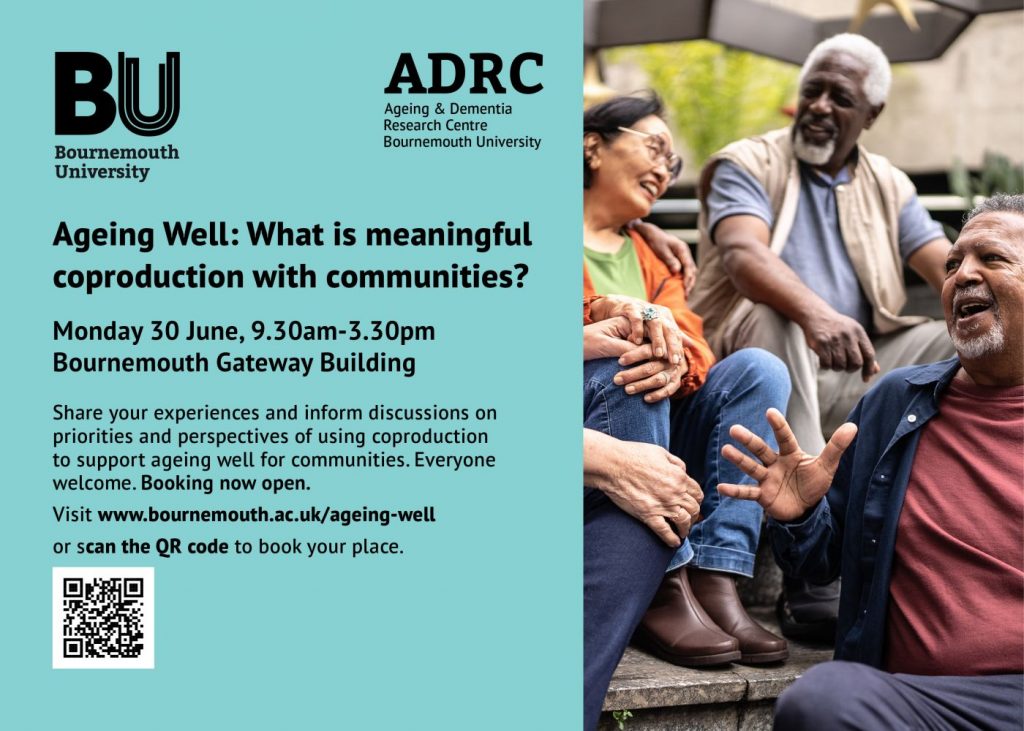
Latest research and knowledge exchange news at Bournemouth University

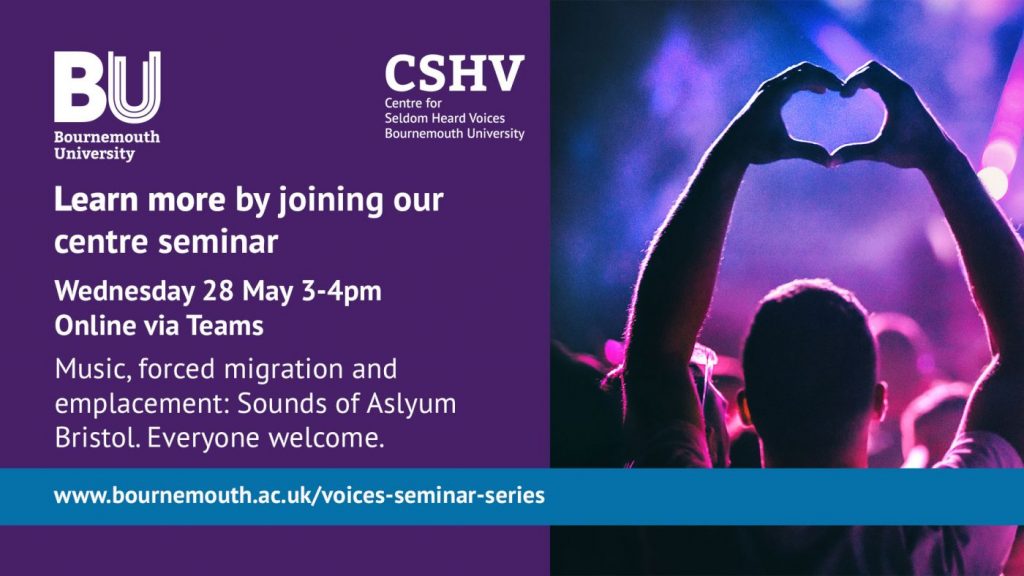

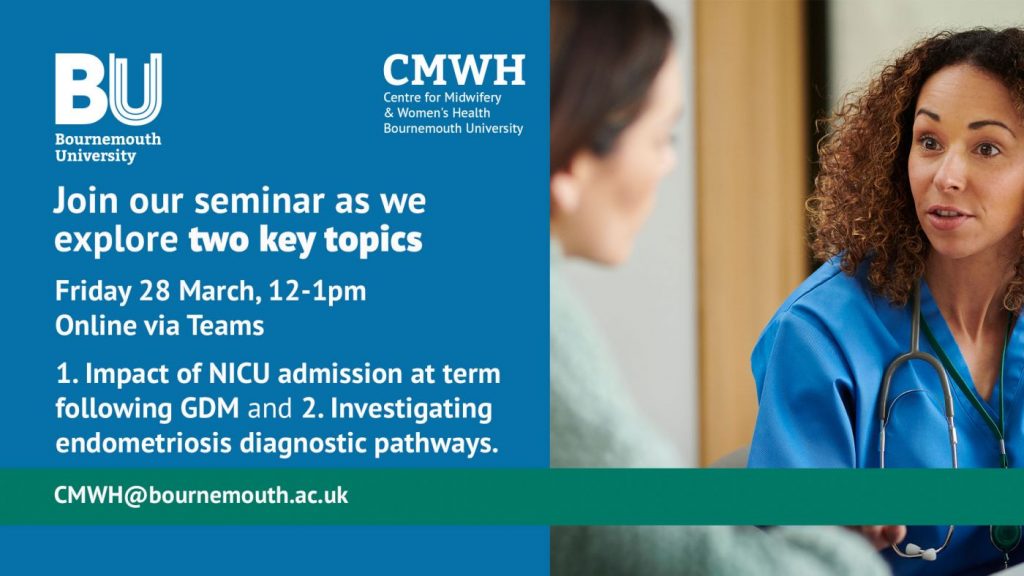
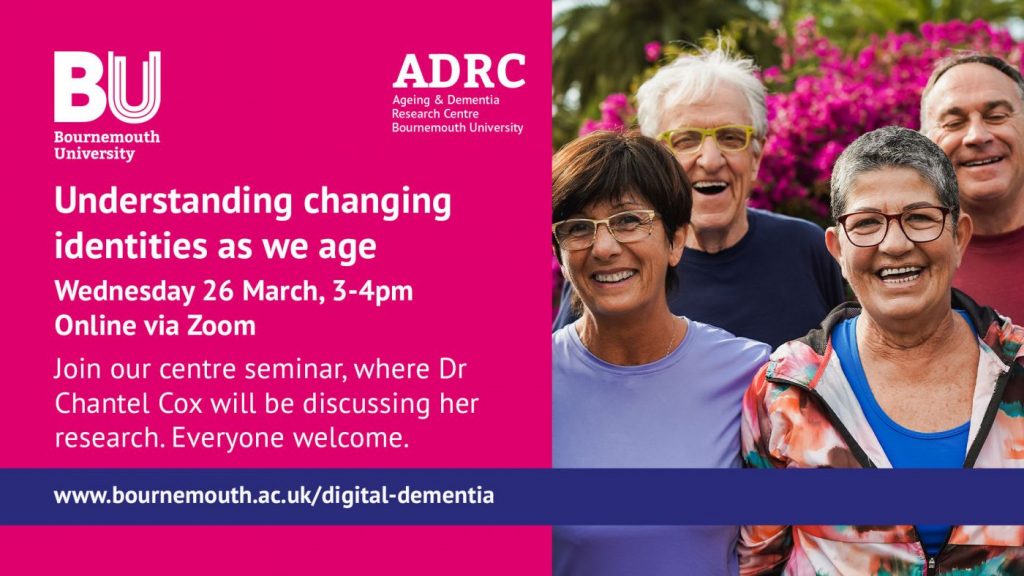




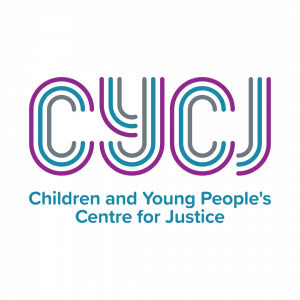
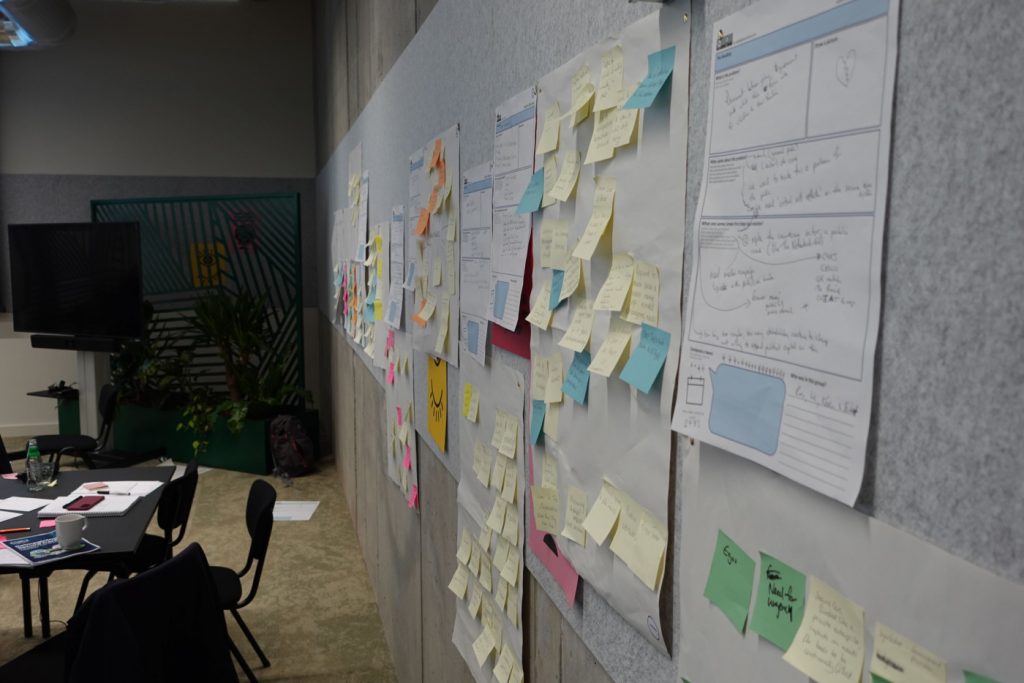
The event was designed to explore critical questions in developing secure care for children, offering national and global perspectives. Secure care, in its traditional form, is locked institutional care for children aged 10 to 17. Children can enter secure care either on criminal justice grounds, when aspects of their behaviour are considered to pose a risk of harm to others, or on welfare grounds, when the risk of harm is to themselves, though there is often an overlap. Our workshop aimed to explore how the continuum of services, including secure care could evolve to better meet the needs of the children, and young people who may require such responses and often come from challenging backgrounds, with experiences of childhood trauma and poly-victimisation. The event’s target audience included practitioners, managers, and stakeholders who are involved with secure care for children.
To start with the most important bit, the food at the venue – which itself was very cool – was incredible. The day started with freshly baked pastries, followed by cakes mid-morning, a delicious grazing platter for lunch (with some accidental haggis consumption by one member of our party!), and an unexpected, yet very much enjoyed, basket of pittas, olives and homemade houmous in the afternoon. If nothing else, our attendees went home full, but we have a feeling they took away much more than satisfied taste buds.
Kicking off the day, three experts provided insightful presentations to secure care in their respective jurisdictions. First, Donna McEwan and Dan Johnson presented the recently released CYCJ ‘Re-Imagining Secure Care’ report. Donna detailed key questions that need to be asked when we think about what the future of secure care could look like, including:
The second presentation, by Eva Mulder (Professor by Special Appointment at the University of Amsterdam), was particularly impressive as Eva and her colleagues had spent the night standing on the street following a fire alarm at their hotel, and Eva had not had any sleep. Hats off to Eva! Eva described her research exploring how secure institutions can be made to look and feel like home, using young people’s photographs of home. It was interesting to hear how ‘home’ was conceptualised in terms of feelings – for example, home is somewhere where there are people you know, you feel like you belong, you can be alone when you want to be, there is food that you like, and you feel free. Eva encouraged us to contrast these ideas with how institutional buildings make children feel. Eva described new small-scale residences for children in the Netherlands, without locked doors, where there is continuity with a small team of staff and integration with the community. Research in these places revealed that staff feel that they can develop better relationships with the young people, and the young people want to make more of an effort with the staff and their treatment, and parents feel more included. Eva ended by describing how there is a campaign in the Netherlands to end secure care completely, and how this requires a solution within the community that can keep children safe.
Last, but by no means least, Dr Kate Crowe took to the stage. Kate was awarded a Churchill Fellowship in 2022 to investigate alternatives to secure care in Hawaii, Canada, Scotland and the Netherlands. In 2023 she was awarded a Creswick Fellowship and she travelled to Iceland, Finland and Scotland to investigate the position and design of secure care in light of Australian jurisdictions raising the minimum age of criminal responsibility (MACR). Kate prompted the audience to consider how models of secure care might need to change as the MACR increases. She also posed the perennial question in this area – should children on welfare placements be placed alongside children deprived of their liberty on criminal justice grounds? Along with other details from her travels, the audience were very intrigued to find out from Kate that all secure facilities in Finland have saunas!
With these thought-provoking presentations in mind, participants were divided into six focus groups. Discussions between the group members were audio recorded so that they could be captured as research data. Participants explored critical questions, such as:
At the end, participants explored three core questions that aim to lead to calls for action in the participant’s respective spheres of influence:
Several preliminary findings emerged from the discussions:
This event was about exchanging information, but it also aimed at suggesting meaningful options for further development. The participants shared creative ideas, and the discussions showed a willingness to push for progress to improve care for arguably the most vulnerable children in out-of-home care.
One of the most interesting ideas was to embed secure care services more closely in local communities. This would promote closer cooperation among providers, mental health services, and educational support systems.
At the end of the event, it became clear that this seminar was a stepping stone towards future progressive developments in secure care. Participants identified critical areas for immediate action, both within secure care settings and in the broader community and at the intersection between these two worlds. This is crucial for building a system that protects children and communities and supports their long-term rehabilitation and reintegration.
This workshop was a success because it allowed participants to share knowledge, discuss challenges, and develop actionable solutions for the future of secure care. It is an essential reminder of how far we have come—and how much further we want and need to go—to ensure that secure care can continue to meet the needs of children and young people who meet the criteria for secure care. This event provided an excellent opportunity to reflect on the challenges in secure care and consider future development options.
This event also acts as a reminder of how much can be achieved when a group of like-minded people with a common goal come together. We feel privileged to be working with our national and international partners, and we look forward to our next event, wherever in the world that might be. Our thanks go out to our Faculty at Bournemouth University who funded this event.
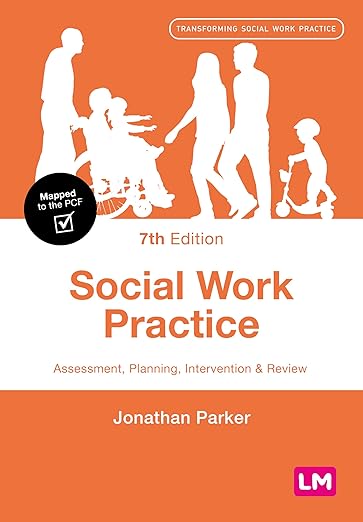 Congratulations to Bournemouth University’s Emeritus Professor Jonathan Parker who has just published the 7th edition of his best-selling Social Work Practice. This latest edition of Social Work Practice comes with updated content and case studies. First published in 2004, this textbook has guided social work students through the processes of working with people, groups and communities looking at the politics of assessment, planning, intervention and review and negotiating a value-based approach to practice that acknowledged the centrality of relationships and respect for the people with whom social workers practice.
Congratulations to Bournemouth University’s Emeritus Professor Jonathan Parker who has just published the 7th edition of his best-selling Social Work Practice. This latest edition of Social Work Practice comes with updated content and case studies. First published in 2004, this textbook has guided social work students through the processes of working with people, groups and communities looking at the politics of assessment, planning, intervention and review and negotiating a value-based approach to practice that acknowledged the centrality of relationships and respect for the people with whom social workers practice.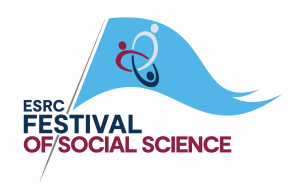
The workshops involved discussions about on-line spaces that make LGBTQ+ young people feel safe, happy and provide them with a sense of belonging. Three workshops took place in August and October. Six themes emerged from group discussion at the workshops:
A final point, from the workshops, was that meeting other LGBTQ+ people in-person and doing something together in physical space would be nice.
The above themes were handed over to an artist who composed a series of six picture boards. These picture boards are on display at The Lighthouse in Poole from Friday 25th October to 16th November. The Lighthouse have publicised the project. Go to: Communities of wellbeing: the digital lives of LGBTQ+ young people – Lighthouse
The artwork will also be on display at the ESRC event at University of Southampton on Saturday 9th November as part of Arts and Humanities Day.
Pooja Shah, a postdoctoral researcher working on the Tangerine project (aiming to develop a novel intervention to improve nutrition and promote healthy ageing among older people from South Asian and Afro Caribbean communities in the UK) attended a roundtable discussion at the King’s Fund to explore what a greater focus on nutrition could mean for the health care system and those at risk of malnutrition. Discussion focused on the causes, prevalence, diagnosis and response to malnutrition. This included how we can engage those working across the health and care system at a national and local level – including primary care, social care, and those with clinical expertise – with improving the early diagnosis of malnutrition through patient screening, greater awareness, and the use of tools for better population health management. In the context of an ageing population, the roundtable also provided an opportunity to discuss the role of improved nutrition and targeted interventions in enabling people to remain independent for as long as possible.
The Kings Fund are delighted to share their recent blog, based on the roundtable discussion.
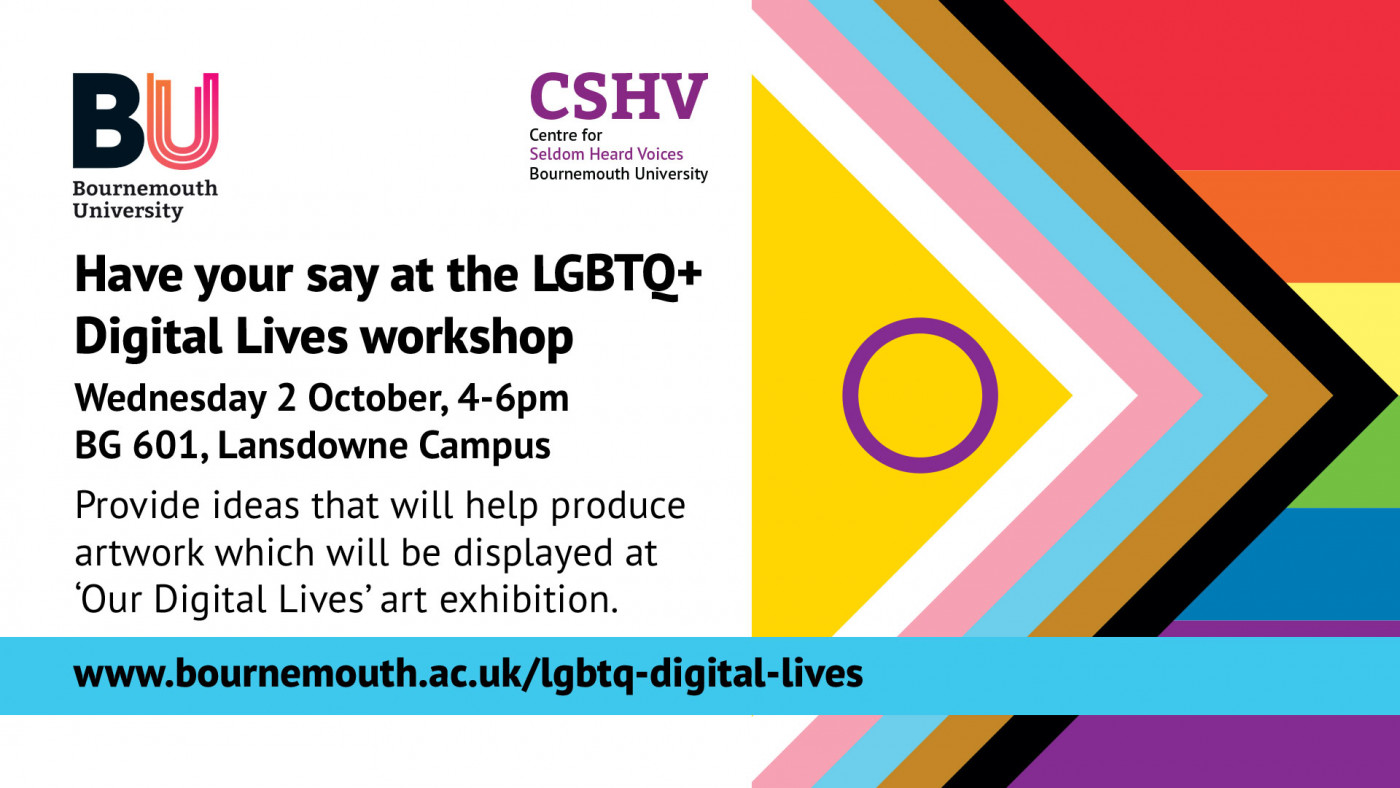
Over the summer, Jane Healy (Principle Academic in Criminology at Bournemouth University) led an inter-disciplinary research team at Bournemouth University and Royal Holloway which has conducted a survey to evaluate approaches to safeguarding adults who experience hate crime and discriminatory abuse.
Responses were received from across the UK, identifying challenges and providing examples of good practice. We are keen to share these findings as widely as possible.
The team are hosting a webinar where they will outline the context of hate crime and discriminatory abuse and discuss the anonymised findings and next steps, in a free online event on Tuesday 22 October 2024, from 12pm to 13:30pm.
Please click on this link to reserve your tickets: Exploring restorative practice approaches to safeguarding adults Tickets, Tue 22 Oct 2024 at 12:00 | Eventbrite
Please forward to anyone who might be interested in learning more about hate crime and discriminatory abuse, and the research findings.
We look forward to seeing you all at the online event.
Jane Healy and team
Congratulations to Professors Sara Ashencaen Crabtree and Jonathan Parker who, together with academic colleagues from Cost Rica and Malaysia, published in the journal Debates En Sociología [1]. Their latest sociology paper focuses on Indigenous research, its costs, benefits and problematic issues, drawing on theoretical insights from Bourdieu. Both Sara and Jonathan are based in Bournemouth University’s Department of Social Sciences & Social Work.
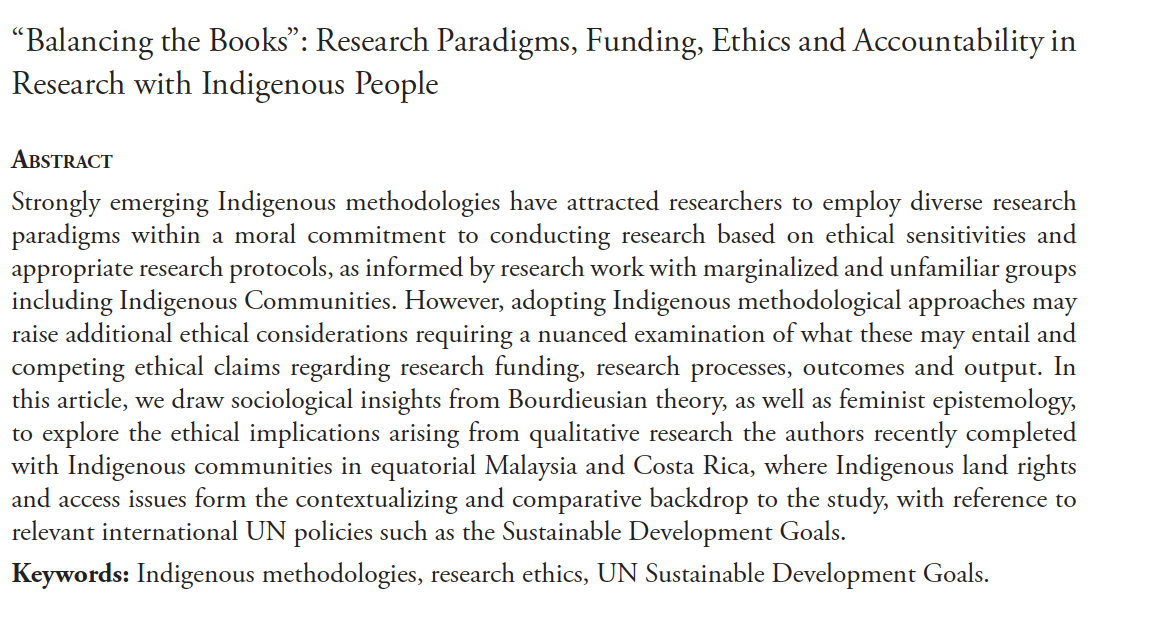
Congratulations!
Prof. Edwin van Teijlingen
CMWH
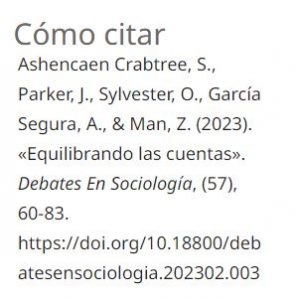
This week is UK Postdoc Appreciation Week and we are celebrating and showcasing the achievements of our postdoctoral researchers and their important contribution to research at BU.
Today’s post is by Dr Rejoice Chipuriro, Post-Doctoral Researcher In Social Care, about her experiences as a postdoctoral researcher…
I trained as a social worker in Zimbabwe before relocating to South Africa where I obtained my MA in Social Development and PhD in Sociology. I joined Bournemouth University in February 2022 as a post-doctoral researcher in the Department of Social Science and Social Work.
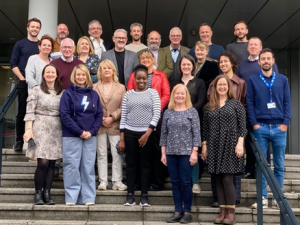
Dr Rejoice Chipuriro with her wider research team
I have worked in community-led interventions and health research programmes in Southern Africa and in the UK. My current research projects are both funded by the National Institute of Health and Social Care and focus on community assets and how these contribute to people’s health and wellbeing (commonhealthassets.uk).
I also work with a local arts-based community organisation which supports mental health for marginalised populations such as asylum seekers, people in recovery from drug and alcohol use.
I was initially drawn to social work as a helping profession and later I ventured into research to learn from and understand the societies that I worked in. When I practised social work, I noticed that beyond individual pathologies lay structural and socio-economic issues that either developed or deprived access to life enhancing choices and opportunities. This led me to studying social development and sociology. I found these inter-disciplinary postgraduate courses helpful for my community work.
I was able to co-design participatory and anti-oppressive interventions with the help of people in the communities as experts by experience. I enjoy supporting people going through life transitions as well as groups and communities striving for a more equitable and just society for all.
What I like about being a post-doctoral researcher
I have travelled widely and met researchers, academics, and communities of practice across the globe, which is an enriching experience. I have presented my research in three continents and collaborated on research across the globe. My network is expansive, and I have accessed resources, intellectual support, and mentorship which has helped me grow professionally. I bring with me this international experience into my work, and this benefits the students and communities I support. When work is challenging, I have empathetic colleagues who hold the space for me and offer encouragement when I need it most.
I have been granted opportunities to teach social work and sociology units as well as to co-facilitate CPD units. I am still mastering teaching skills whilst I support colleagues in lesson planning, delivering virtual and in-person teaching and assessments. I enjoy doing things out of my comfort zone and this aspect of my academic training was at first intimidating but now pleasant. I have settled into my teaching duties well and I like infusing the creative as well as pragmatic aspects of my research into the lectures to enhance student learning experience from different fields of practice.
I was allocated a fellow post doc to be my uni buddy, who helped me settle into my role and the practicalities of living in Bournemouth and we became friends, which alleviated some loneliness away from home. I was assigned mentors to help direct my career progression. From the mentorship I managed to submit a successful portfolio of evidence for my associate fellow Advance HE. I also got mentorship in submitting research bids and got my first grant as a Principal Investigator. These achievements are an indicator of the time and effort invested into professional development for post-docs at BU.
The difficult part of being a post-doc
The writing process for peer reviewed publication can be lonely and arduous. However, BU has put in place support for post-docs to attend writing retreats, meet fellow post-docs, exchange ideas and make friendships. This alleviates loneliness and the retreats are an opportunity to learn from established academics. I have joined research centres such as the Centre for Seldom Heard Voices and the Women’s Academic Network, where I present my work and get feedback, which has also positively impacted my academic publishing.
If you’d like to write a blog post to share your appreciation for our postdoctoral researchers, please contact research@bournemouth.ac.uk. You can also get involved on social media during Postdoc Appreciation Week by using #LovePostdocs and #NPAW2023 on Twitter and Instagram and tagging us @BU_Research or @UK_NPAW.
 Late last week my colleague Dr. Pramod Regmi, Senior Lecturer in International Health, returned home from his Erasmus+ exchange to Nepal. He brought home for me a copy of the MMIHS (Manmohan Memorial Institute of Health Sciences) Souvenir 2023, this outliens key events at the institution of the past year. One of the write ups in the Souvenir is from the seven MMIHS M.Sc. students in Public Health who visited Bournemouth University in late 2022-early 2023 for three months.
Late last week my colleague Dr. Pramod Regmi, Senior Lecturer in International Health, returned home from his Erasmus+ exchange to Nepal. He brought home for me a copy of the MMIHS (Manmohan Memorial Institute of Health Sciences) Souvenir 2023, this outliens key events at the institution of the past year. One of the write ups in the Souvenir is from the seven MMIHS M.Sc. students in Public Health who visited Bournemouth University in late 2022-early 2023 for three months. 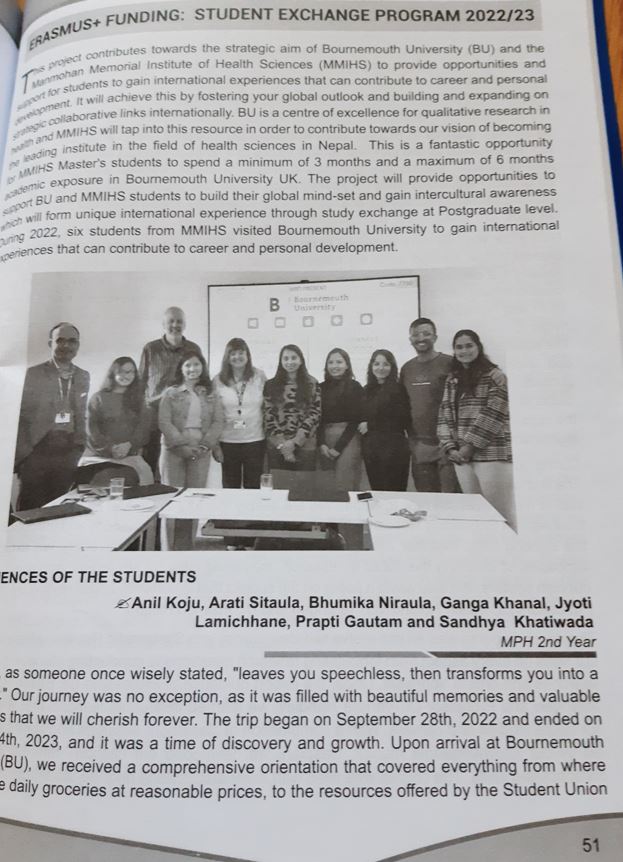 The students have since all completed their M.Sc. in Public Health at MMIHS. Their story highlights some of the British features of student life which were new to them. These included the support they received from our SUBU (=students’ union), or registering with the NHS, and the UNIBUS app, as well as cultural celebrations during their time in Dorset, such Halloween, Christmas and New Year. They rave about the module Public Involvement in Research and specifically thank Dr. Mel Hughes and BU’s PIER (Public Involvement in Education & Research) team. Their second module at BU focused on Systematic Reviewing, they particularly mention the guidance and support received from Prof. Vanora Hundley in the Centre for Midwifery & Women’s Health (CMWH) and our Faculty of Health & Social Sciences librarian Mr. Caspian Dugdale.
The students have since all completed their M.Sc. in Public Health at MMIHS. Their story highlights some of the British features of student life which were new to them. These included the support they received from our SUBU (=students’ union), or registering with the NHS, and the UNIBUS app, as well as cultural celebrations during their time in Dorset, such Halloween, Christmas and New Year. They rave about the module Public Involvement in Research and specifically thank Dr. Mel Hughes and BU’s PIER (Public Involvement in Education & Research) team. Their second module at BU focused on Systematic Reviewing, they particularly mention the guidance and support received from Prof. Vanora Hundley in the Centre for Midwifery & Women’s Health (CMWH) and our Faculty of Health & Social Sciences librarian Mr. Caspian Dugdale.
Unfortunately, the Erasmus+ scheme has come to an end, but Bournemouth University has just been awarded funding for a serious number of Turing Scheme exchanges. The latter is for BU students to go aboard, and this funding supports study exchanges, work placements, voluntary traineeships and other international extra-curricular or curricular activities worldwide for a minimum of 28 days and maximum of 12 months.
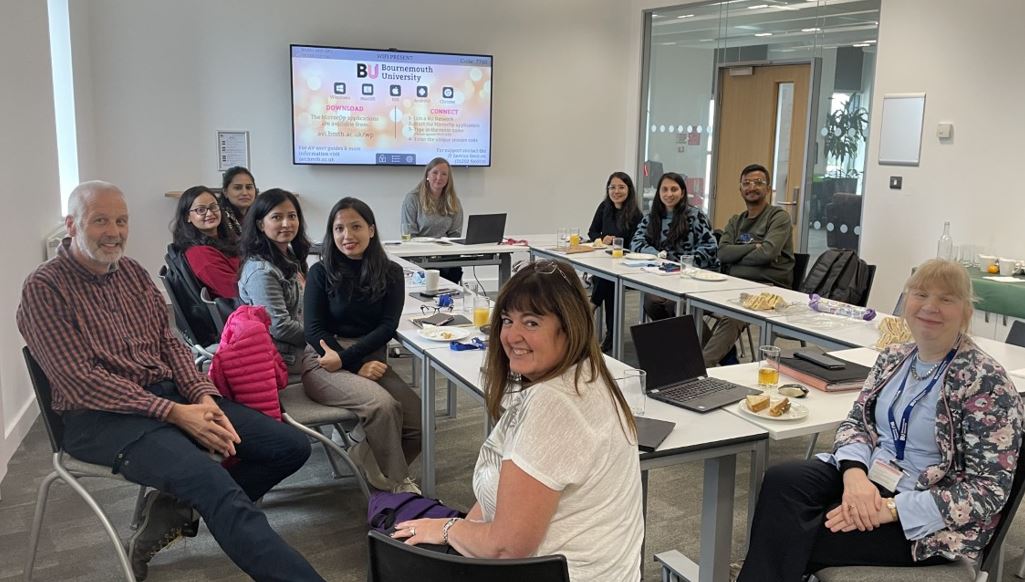
Prof. Edwin van Teijlingen
CMWH
The Centre for Seldom Heard Voices is delighted to invite you to a special international guest lecture featuring social anthropological research on ‘pacing adult womanhood’ in precarious situations, here through the case study of young women’s situation in Kosovo. Dr Rozafa Berisha (Manchester/ Prishtina), currently visiting the social anthropology sister programme in the Social Science and Social Work department through our Erasmus+ K107 programme in partnership with University of Prishtina, Kosovo, will present her research on Thursday, 27th April, 15:00 to 17:00 in EB-206. All interested staff and students welcome! More details are available in this poster: Rozafa Berisha poster
Follow the thoughts and reflections of the guest editorial team through our special issue blog series. The special issue of the British Journal of Social Work: Voice and Influence of people with lived experience is written, edited and reviewed by people with lived experience of social work. To date we have received 140 submissions across the three categories of academic papers, reflective pieces and creative artefacts. Follow our progress as we work toward publication in Spring 2023 via our blog series here